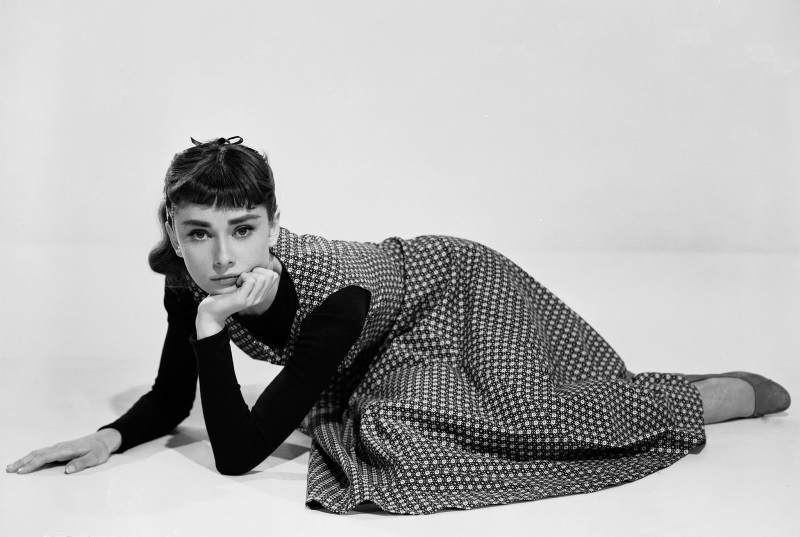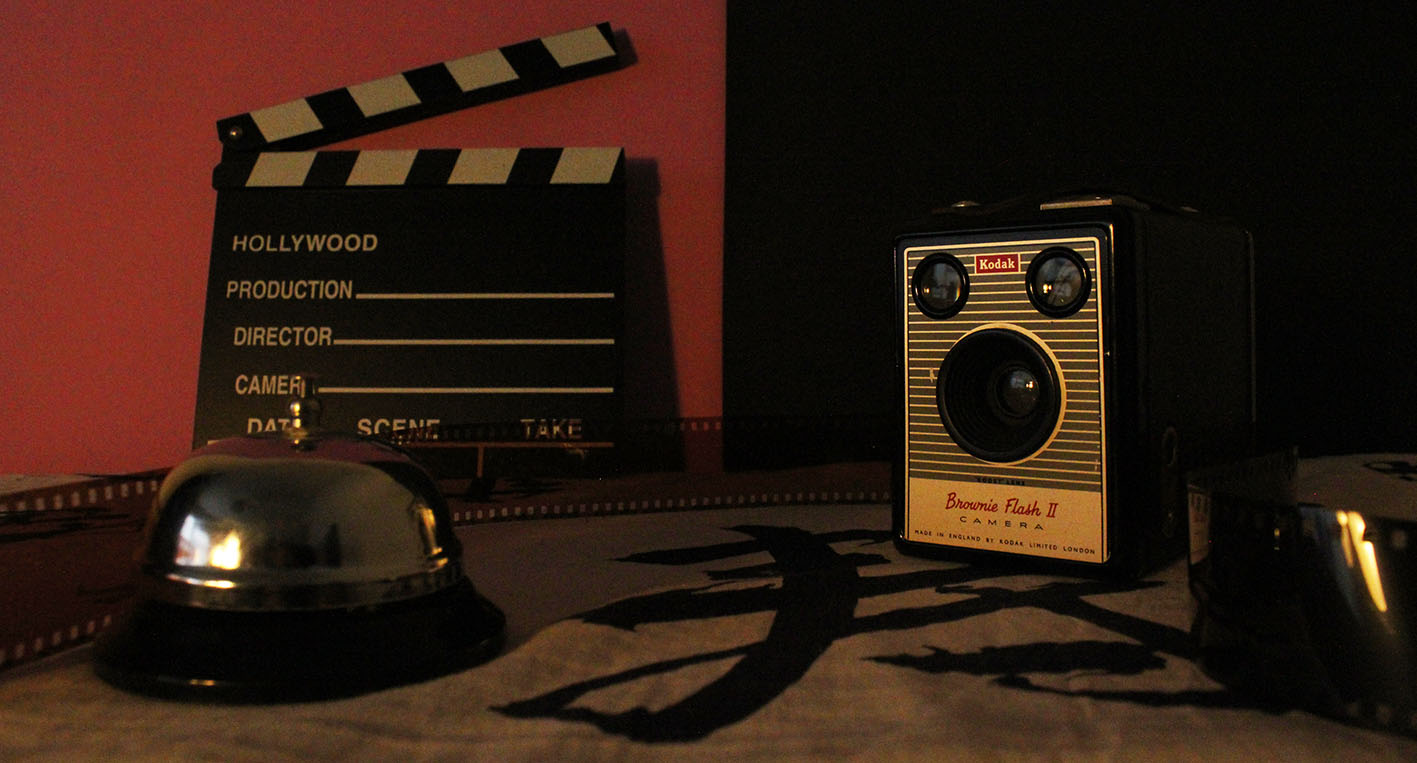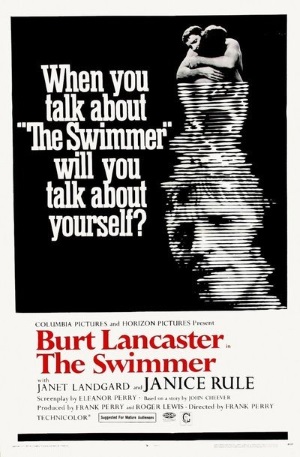Will They?/Won’t They?
***This Review Contains Spoilers***
Never again will the screen see such grace as Audrey Hepburn. Marilyn is hot, but Audrey is beautiful. However its Audrey being the goddess that she is which brings about the major flaw in Sabrina – you cannot make Audrey Hepburn look like a scrawny chauffeurs’ daughter. It doesn’t matter what she wears, Audrey can make any piece of dowdy clothing look glamorous (later in the film she even makes a lumberjack shirt look feminine). After all, in the original stage play, Sabrina Fairchild was played by the down to Earth Margaret Sullivan. Despite this, the sheer enchanting screen presence of Audrey Hepburn, as well as her childlike innocence does help to some degree, overcome this suspension of disbelief. The opening of Sabrina couldn’t be more impossibly romantic – a clear sky with a full moon, Isn’t It Romantic playing the background and a forbidden love imposed by class differences. Well that is until things take a dark U-turn and Sabrina attempts to commit suicide by locking herself in a garage with multiple car exhaust pipes emitting carbon monoxide. Even in a moment as disturbing as this, a joke is still thrown in with that one popping exhaust pipe (likewise did Sabrina’s father ever discovering that suicide note?).

Humphrey Bogart in the role of business mogul Linus Larrabee gets an opportunity to show his flair for light comedy. Bogart is such a pleasure to watch in the many witty lines he delivers, in particular the inter-office memo he sends to his brother David via a car phone. Linus Larrabee is a benevolent capitalist and not the stereotypical archetype of the evil business owner, as he brilliantly sums up in an exchange he shares with David:
“A new product has been found, something of use to the world. A new industry moves into an undeveloped area. Factories go up, machines are brought in, a harbour is dug up and you’re in business. It’s purely coincidental of course that people who’ve never seen a dime before suddenly have a dollar and barefooted kids wear shoes and have their teeth fixed and their faces washed.”
Linus evens has connections to a military general who can get him a bazooka to test against his revolutionary plastic, showing he has some Elon Musk in him. Likewise unlike as seen in many screwball comedies of the 1930’s, the servants of the Fairchild family have a perfectly amicable and respectable relationship with their masters.

David Larabee (William Holden) is the polar opposite of his brother – a 1950’s Billy Madison who lives for hedonism. Holden looks rather ghastly with his bleached hair and the ugly dressing gowns which he wears throughout the film. Sabrina has been head over heels for David since childhood but her love of the man was always forbidden due to class, well until her transformation after spending two years in Paris. David does not appear to be much longer than Linus, which is odd as it’s mentioned at one point in the film that David had kissed Sabrina when she was nine during a time they were roller skating. I never quite get what Sabrina sees in the immature David – this goes for both the original and the remake (more on that later).

At its heart, Sabrina is a story about true love vs. romantic love. Sabrina may be romantically infatuated with David, but ultimately it’s Linus of whom she is destined to be with. The age difference between Audrey and her leading men in multiple films is often a topic of conversation with the casting of a 54-year-old Bogart as a romantic love interest to a 25-year-old Hepburn not being the most obvious choice. Changing social norms since the 1950s and the feminist movement have made it anathema for a woman to rely on a man for money or status, making older man/younger woman relationships age gaps more taboo in modern times. Personally, I’ve seen enough old films with relationship age gaps that I’m more used to it plus the argument can be made that many women simply prefer an older man. At the very least the movie does acknowledge this age difference (“Here I am going off on a sailboat to make an ass out of myself with a girl of 22”). Age aside, with Bogart’s arrogance and overly masculine voice, Audrey isn’t the most obvious choice to play off him – she’s not like Lauren Bacall or Katharine Hepburn. The argument can be made that the original casting choice of Cary Grant would have been more suitable for the part. Regardless these performers are two of my favourite movie stars of all time and they are a joy to watch together so I personally can’t complain at the end of the day.

That Billy Wilder wit is as strong as ever in Sabrina (“That good, that’s bad” – I can see where a certain Simpsons joke came from), with the film also including one of the most clever and witty methods in which a film got around the censorship of the day (“What rhymes with glass?”). On a technical level, it’s also notable that Sabrina was filmed in the 4:3 aspect ratio, despite being released in late 1954, making it one of the last Hollywood productions to do so as almost all movies at this point where being shot in various widescreen formats. Coming off the heels from Sunset Boulevard, Ace In The Hole and Stalag 17, I get the impression Billy Wilder wanted to do something more pleasant and straightforward with Sabrina. I don’t consider Sabrina to be one of Wilder’s best films but I do enjoy it despite its flaws and the relationship dynamics requiring much suspension of disbelief. When a rom-com sparks an interesting debate on whom the female lead should have ended up with, to an extent it has done its job. However, unpopular opinion time, I will argue that the 1995 remake of Sabrina directed by Sydney Pollack is a superior film.

The remake of Sabrina carries the same themes and follows the same basic plot of the original but with some notable adjustments, the most prescient of these being Sabrina’s (Julia Ormond) transformation in Paris being far more significant. At the film’s beginning, Sabrina really is a scrawny, nerdy girl with a dreadful fashion sense and very long, unkempt hair. Her time in Paris takes up a significant portion of the film (this time working as a photographer for Vogue rather than going to a cooking school) in which she gets mentored by others and comes out of her shell. Symbolically her hair gradually gets shorter over the two year period and returns to the US unrecognizable (I’m just slightly disappointed the remake doesn’t include the attempted suicide scene). Unlike the original, the Paris scenes are filmed on location and are the most distinctly 90’s portion of the film with the fashions and music (nice cover of Love’s In Need Of Love Today). So who is the better Sabrina? I know its sacrilege to outrank Audrey Hepburn, but going from the standpoint on both superior writing and more appropriate casting, Ormond’s rendition of Sabrina does have greater depth, is more believable and is portrayed with a greater sense of vulnerability.

Who was the better Linus? You’re asking me to pit two of my favourite actors of all time against each other. Harrison Ford plays the part beautifully with his trademark comic grumpiness and a real sense of loneliness, and even with the 90’s setting, Ford’s Linus remains a conservatively dressed man with his glasses, dotted bowtie and Homburg hat. The remake also features a much more resentful relationship between David and Linus. In the original, Linus is not impressed with David but doesn’t harbour much resentment, whereas in the remake the relationship is far more antagonistic (“My life makes your life possible – I resent that – So do I!”). I do wish however they could have retained the benevolent capitalist aspect of his character as Bogart portrayed. I feel like going for a tie but I know that’s a cop-out so ultimately I will have to choose Ford once again due to the superior writing and more appropriate casting – Ormond and Ford are simply a more believable romantic pair.

Lastly who was the better David? Greg Kinnear does a good job at portraying the hedonistic sleaze of David, while his turnaround towards actually doing work at the end is a very nice comic touch. Yet even the additional aspect of the antagonistic relationship, I would choose Holden on the account of simply being a more charismatic and likeable screen presence. Likewise, I do particularly enjoy John Wood as Sabrina’s father, a real charmer of an English gentleman, while Paul Giamatti gets one of his earliest screen roles but it’s just a shame he’s given nothing to do. I’d even go as far as saying that Sabrina ’95 provides a greater feast for the senses. The location filming of the North-Eastern United States (notably including Martha’s Vineyard) with the gorgeous architecture alongside the breezy John Williams score, makes the film a very relaxing watch (I also have to ask, was the film’s poster inspired by that of Billy Wilder’s Fedora?). While I hate having to outrank these classic Hollywood legends, Sabrina ‘95 is a rare remake which remains a classy affair and outperforms the original.





